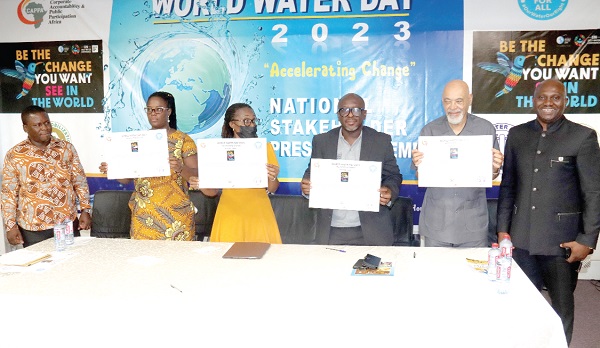
GWCL invests $700m in water projects
The Ghana Water Company Limited (GWCL), with support from the government, has invested $700 million in nine water projects throughout the country in the last five years as part of efforts to deliver safer water to consumers.
Advertisement
The development has helped to jump access to potable water in urban areas to 93 per cent.
The Head of Communications of the GWCL, Stanley Martey, who made this known, said the company was working with the government to ensure that universal water coverage was met by 2030, in line with the Sustainable Development Goal Six (SDG 6), which focuses on access to water and sanitation for all.
He was speaking at a national stakeholders’ press briefing by Revenue Mobilisation Africa to mark this year’s World Water Day (WWD) in Accra.
It was on the theme: “Accelerate for change”.
Challenges
Although the national demand for urban water was 321 million gallons per day (MGD), Mr Martey said, the company was able to produce 199MGD, leaving a gap of approximately 122.
He said the GWCL was currently working in collaboration with the Ministry of Sanitation and Water Resources “to close the gap between demand and supply”.
To ensure access to all, he said, the company had established a Low-Income Community Support Department which had so far served over 17,100 properties in low- -income urban communities through a subsidised new service connection.
The department, he said, had secured funding to provide an additional 12,400 connections, which would benefit over 1.25 million people directly and indirectly, with estimated consumption of about 3.7 million cubic metres per annum.
Buffer zones
The Minister of Water Resources and Sanitation, Cecilia Abena Dapaah, in a statement read on her behalf by the Water, Sanitation and Hygiene Programme Officer of the ministry, Suzzy Abaidoo, said to protect water bodies and ensure the availability of water, the ministry had collaborated with the Water Resources Commission (WRC).
Measures put in place, she said, included the development of the buffer zone policy to address human activities which happened close to the banks of water bodies.
She was, however, quick to indicate that the accompanying LI which would enforce some portions of the policy was still ongoing.
She also said degraded land along the banks of some major water bodies, such as the Birim, Pra and Tano basins, had been restored, while the banks of the Black Volta had been identified for restoration.
She said the WRC had also undertaken 70 major ecological and hotspot monitoring in the river basins which were principally related to buffer zone encroachment and pollution from improper water use and disposal of solid and liquid waste.
To solve the water crisis, the minister urged all to use water wisely, desist from activities that polluted water bodies, stop open defecation and use toilet facilities, practise water hygiene, among others.
The Executive Director of Revenue Mobilisation Africa, Jeffery Ocansey, urged all stakeholders to play their roles to ensure that everyone had access to safe water and support the provision of quality and affordable water for all Ghanaians, especially the vulnerable in society, including the aged, poor, persons living with disabilities and women.
He suggested the creation of special funds for water and increase in government budgetary allocation to the water sector to ensure access to water and sanitation facilities for the citizenry.
Mr Ocansey condemned the activities of fishers who used poisonous substances for fishing in water bodies, a practice which contaminated the water bodies, saying “such activities increase the cost of treating and managing water.
When the cost goes up, it will be passed on to the consumer”.
All participants signed pledge cards which called on all to join millions across the world during the celebration of the 2023 WWD to support in 'accelerating change’ by ensuring the protection of water resources from threats and privatisation.




